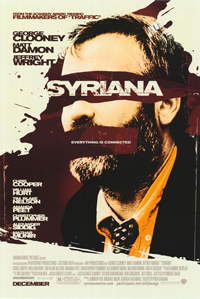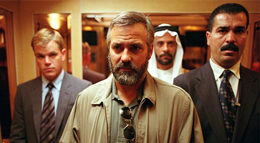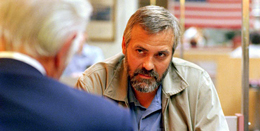We live in cynical times. Corruption in government is no longer a scandal — it’s the status quo. Huge conglomerate mega-companies are more powerful than entire countries. The term “corporate conscience” exists now only as an oxymoron.
 It is precisely this sort of brazen, out-of-control behavior from the filthiest rich of the world’s population that leads to the apathy of the majority of the country. Considering the widespread amount of disdain and disinterest on the subject then, it is a wonder that Syriana, the new film from writer/director Stephen Gaghan, has the power to drum up any sort of appealing drama about the global oil industry.
It is precisely this sort of brazen, out-of-control behavior from the filthiest rich of the world’s population that leads to the apathy of the majority of the country. Considering the widespread amount of disdain and disinterest on the subject then, it is a wonder that Syriana, the new film from writer/director Stephen Gaghan, has the power to drum up any sort of appealing drama about the global oil industry.
The first-time director’s approach is nothing new, especially if you’ve seen Steven Soderbergh‘s Traffic, for which Gaghan received a Best Adapted Screenplay Oscar. Where Traffic involved multiple storylines built around the U.S. drug war policies, Syriana spins a labyrinthine plot revolving around big players and little pawns in the global struggle for oil dominance.
Where Soderbergh opted for a grainy look with saturated colors (especially in the Mexico scenes), Gaghan delivers a movie with a gritty feel of another kind. Imagine that the brightness on your TV set is up a little too high, making the all the black look more like light gray, and you’ll get an idea of the look of “Syriana.” This bathes the entire film in an eerie, cheerless glow that represents the oppressive heat on one side of the globe and the rampant unscrupulous scheming on the other.
 All the main characters face huge ethical dilemmas in their personal lives, but all are somehow tied to the complicated issues surrounding oil. George Clooney is thinly disguised under 30 extra pounds and a beard as an undercover CIA agent who specializes in Middle East intrigue. Matt Damon plays a rising oil broker living in Switzerland who deals with a family tragedy by immersing himself in his new job, assisting a Gulf prince (Alexander Siddig) who is actually concerned with something other than making more money. Jeffrey Wright is a corporate lawyer caught between the merger of two monster oil companies and an alcoholic father who views him as a sell-out. The least effective plot involves a Pakistani teen (Mazhar Munir) who, desperate for work, falls in with a questionable crowd and finds a new purpose in life.
All the main characters face huge ethical dilemmas in their personal lives, but all are somehow tied to the complicated issues surrounding oil. George Clooney is thinly disguised under 30 extra pounds and a beard as an undercover CIA agent who specializes in Middle East intrigue. Matt Damon plays a rising oil broker living in Switzerland who deals with a family tragedy by immersing himself in his new job, assisting a Gulf prince (Alexander Siddig) who is actually concerned with something other than making more money. Jeffrey Wright is a corporate lawyer caught between the merger of two monster oil companies and an alcoholic father who views him as a sell-out. The least effective plot involves a Pakistani teen (Mazhar Munir) who, desperate for work, falls in with a questionable crowd and finds a new purpose in life.
Syriana works best when it sends its characters careening off into the unknown, putting them into potentially dangerous situations. It feels like anything could happen at any given moment, rather than a plot that is constructed to follow some sort of pat structure with obvious character arcs. At the same time, however, it is a daunting task to keep all of the supporting characters straight. With the constant babble of corporate-speak, which may as well be Aramaic to me (Hey, it worked for Mel!), it is even harder to follow the story’s intricacies.
 What saves Syriana from being a boring civics lesson is the second half of the movie, where all of the complex, hard-to-follow threads begin to coalesce, some in the most unlikely of ways. It’s easy to hear issues and politics being discussed, but harder to put a human face on the problems. (The Constant Gardener did this earlier this year in spectacular fashion, with a lot less characters, but no less ambition.)
What saves Syriana from being a boring civics lesson is the second half of the movie, where all of the complex, hard-to-follow threads begin to coalesce, some in the most unlikely of ways. It’s easy to hear issues and politics being discussed, but harder to put a human face on the problems. (The Constant Gardener did this earlier this year in spectacular fashion, with a lot less characters, but no less ambition.)
The film’s American and Arab relationships are strained out of different specific circumstances, but the similarities between both cultures’ fathers and sons are universal.
Gaghan’s characters are drawn with a couple quick and defining traits, considering the little amount of screen time they each have. Munir is the only actor who suffers for it, though, as his story becomes less and less believable within the short amount of time he is allotted.
At first, it appears that the director has put his characters all together, shaken them up like a snow globe, and let their fates fall where they may. But any script this meticulously crafted would leave little to chance.
 Although it easily could have been an oversimplified “good vs. evil” CBS Sunday night movie, Syriana avoids the pitfalls of such effortlessness. What keeps it from veering off into easy-to-swallow tackiness, is the feel of absolute authenticity. The locations, languages, and the sheer depth of every dark insinuation are the result of an extensive amount of research. Because nobody would ever try to invent behind-the-scenes maneuverings this complex on purpose, they feel genuine, and seem to have a lot of basis in fact.
Although it easily could have been an oversimplified “good vs. evil” CBS Sunday night movie, Syriana avoids the pitfalls of such effortlessness. What keeps it from veering off into easy-to-swallow tackiness, is the feel of absolute authenticity. The locations, languages, and the sheer depth of every dark insinuation are the result of an extensive amount of research. Because nobody would ever try to invent behind-the-scenes maneuverings this complex on purpose, they feel genuine, and seem to have a lot of basis in fact.
Gaghan should be applauded for pulling off such a complicated narrative, even if it may require extensive notes and multiple viewings to catch every nuance.
More than likely you will read words such as “incendiary” and “controversial” whenever this movie is talked about in the media. I agree that there are some pretty Machiavellian moments that pass between the power brokers portrayed in Syriana, but will any of this really come as a surprise to the average moviegoer? I don’t think so.
It may be a depressing thought, but the sheer volume of detail in plot and setting is what gives the film its legitimacy, not the fact that it will shock anyone out of complacency. Many will accuse Hollywood of playing politics, and what’s wrong with that? Syriana is about something, and although it may not change the world, it’s about as timely and captivating as modern issue-related cinema is likely to get.








Comments on this entry are closed.